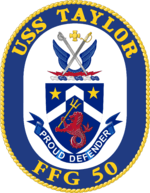USS Taylor (FFG-50)
USS Taylor (FFG-50) leaving Mayport in January 2014 | |
| History | |
|---|---|
| Name: | Taylor |
| Namesake: | Commander Jesse J. Taylor |
| Awarded: | May 22, 1981 |
| Builder: | Bath Iron Works, Bath, Maine |
| Laid down: | May 5, 1983 |
| Launched: | November 5, 1983 |
| Sponsored by: | Barbara A. Taylor, widow of namesake |
| Commissioned: | December 1, 1984 |
| Decommissioned: | May 8, 2015 |
| Identification: |
|
| Motto: | "Proud Defender" |
| Status: | Slated for sale to Taiwan by the Naval Vessel Transfer Act of 2013 |
| Badge: |
 |
| General characteristics | |
| Class and type: | Oliver Hazard Perry-class frigate |
| Displacement: | 4,100 long tons (4,200 t), full load |
| Length: | 453 feet (138 m), overall |
| Beam: | 45 feet (14 m) |
| Draft: | 22 feet (6.7 m) |
| Propulsion: |
|
| Speed: | over 29 knots (54 km/h) |
| Range: | 5,000 nautical miles at 18 knots (9,300 km at 33 km/h) |
| Complement: | 15 officers and 190 enlisted, plus SH-60 LAMPS detachment of roughly six officer pilots and 15 enlisted maintainers |
| Sensors and processing systems: |
|
| Electronic warfare & decoys: | AN/SLQ-32 |
| Armament: |
|
| Aircraft carried: | 2 × SH-60B LAMPS Mk III helicopters |
| Aviation facilities: | |
USS Taylor (FFG-50), an Oliver Hazard Perry-class frigate, was a ship of the United States Navy named for Commander Jesse J. Taylor (1925–1965), a naval aviator who was awarded the Navy Cross posthumously for his heroism in the Vietnam War.
Construction
Taylor's keel was laid down by Bath Iron Works Corp., Bath, Maine, on May 5, 1983. She was launched November 5, 1983, and commissioned December 1, 1984 in Bath, Maine. Taylor was sponsored by Barbara A. Taylor, the widow of the ship's namesake, and Diane Taylor-Oeland as matron of honor.
History
Taylor was homeported in Charleston, South Carolina from 1985-1993. The ship deployed to Northern Europe as part of the Standing Naval Forces Atlantic (STANAVFORLANT) in 1987 and the Persian Gulf in 1988 and 1990. Participated in Operation Earnest Will. In 1993, the Taylor changed homeport to Mayport, Florida with the closing of Charleston Naval Station.
Up to 2015, Taylor was homeported at NS Mayport, Florida, and was part of Destroyer Squadron 14.
In August 2008, Taylor entered the Black Sea conducting a pre-planned routine visit to the region to interact and exercise with NATO partners Romania and Bulgaria. It joined ships from Poland, Germany and Spain.[1]
In September 2010, Taylor was buzzed by a Russian Tu-95 bomber.[2] However, as of 2004, all significant anti-aircraft capability was deleted from this class. On January 8, 2014, Taylor left Naval Station Mayport for her last 7-month deployment to the U.S. 5th and 6th Fleets. On February 5, 2014, Taylor was scheduled to enter the Black Sea along with Mount Whitney in support of the Sochi Olympics.[3]
On February 12, 2014, Taylor ran aground while mooring in Samsun, Turkey during operations supporting the 2014 Winter Olympics.[4] "A senior Turkish port official said the ship's propeller scraped the surface as it was mooring at Samsun."[5] The ship's skipper, Commander Dennis Volpe, was subsequently relieved and reassigned.[6]
Taylor was decommissioned on May 8, 2015, and is slated for transfer to Taiwan[7] as ROCS Ming-chuan (銘傳, PFG-1112).
References
- ↑ Tran, Mark (August 21, 2008). "Russia suspends military cooperation with Nato". Guardian. London. Retrieved August 21, 2008.
- ↑ "U.S. Navy Warship In Black Sea Ahead of Sochi Olympics". February 5, 2014. Retrieved February 5, 2014.
- ↑ "USS Taylor being inspected after running aground off Turkey". February 18, 2014. Retrieved February 18, 2014.
- ↑ "U.S. Warship Deployed Near Sochi Runs Aground". February 19, 2014. Retrieved February 21, 2014.
- ↑ Beardsley, Steven, "Navy relieves USS Taylor's commander after ship ran aground", Stars & Stripes, February 25, 2014
- ↑ "Six Things to Know About USS Taylor (FFG-50)", U.S. Navy, retrieved 9 May 2015
This article incorporates text from the public domain Dictionary of American Naval Fighting Ships. The entry can be found here. This article includes information collected from the Naval Vessel Register, which, as a U.S. government publication, is in the public domain. The entry can be found here.
External links
| Wikimedia Commons has media related to USS Taylor (FFG-50). |
- USS Taylor official website
- Photo gallery of USS Taylor (FFG-50) at NavSource Naval History
- navysite.de: USS Taylor
- MaritimeQuest USS Taylor FFG-50 pages
- USS Taylor propeller accidents AIS tracks in Samsun-Turkey